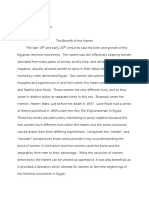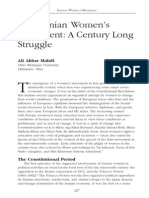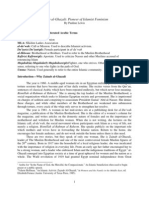0 ratings0% found this document useful (0 votes)
56 viewsHuda Sharawi
Huda Sharawi was an Egyptian feminist and nationalist who played a pivotal role in advancing women's rights in Egypt in the early 20th century. She founded the Egyptian Feminist Union in 1923 to fight for women's suffrage, changes to family law, and greater access to education. A defining moment was when she publicly removed her face veil upon returning from a conference in Rome, sparking the feminist movement in Egypt. Through her activism and the Egyptian Feminist Union, she helped make primary education compulsory for girls, allow women to attend university, and eventually gain women the right to vote in Egypt.
Uploaded by
Melesiya AbdelmassiehCopyright
© © All Rights Reserved
We take content rights seriously. If you suspect this is your content, claim it here.
Available Formats
Download as PPTX, PDF, TXT or read online on Scribd
0 ratings0% found this document useful (0 votes)
56 viewsHuda Sharawi
Huda Sharawi was an Egyptian feminist and nationalist who played a pivotal role in advancing women's rights in Egypt in the early 20th century. She founded the Egyptian Feminist Union in 1923 to fight for women's suffrage, changes to family law, and greater access to education. A defining moment was when she publicly removed her face veil upon returning from a conference in Rome, sparking the feminist movement in Egypt. Through her activism and the Egyptian Feminist Union, she helped make primary education compulsory for girls, allow women to attend university, and eventually gain women the right to vote in Egypt.
Uploaded by
Melesiya AbdelmassiehCopyright
© © All Rights Reserved
We take content rights seriously. If you suspect this is your content, claim it here.
Available Formats
Download as PPTX, PDF, TXT or read online on Scribd
You are on page 1/ 8
Huda Sharawi
Egyptian Feminist and Natalist
Who is Huda Sharawi
Called by “Egypt’s First Feminist”.
Born June 23, 1879.
Raised in a wealthy and highly influential family . As an upper-class female, Huda
Sharawi grew up in the harem system, in which women were confined to secluded
apartments within the home and wore face veils when going outside. She received
an elite education at home.
She was married at age 13 to her older cousin, Ali Sharawi. She lived separately
from him for seven years and in 1900, under pressure from her family, she
reconciled with him. They had two children together Bathna and Muhammad
Leading Action Against British Rule
She organized lectures for women on various topics, bringing them out of
their homes and into public places.
In 1919, Huda organized a women-led protest that included not only women
from Egypt’s elite but also women from the working class and countryside
opposing the British occupation, they were calling for the release of
nationalist leaders who were detained.
Women went out for demonstrations
Rememberable day of Bravery
On her way back from attending women’s conference in Rome, Huda
Shaarawi pulled the veil from her face as she got off the train, and with that
unassuming yet bold action, the feminist movement in Egypt was launched.
Many of the ladies there that day also took off their veils after initially being
shocked by her bravery, which was praised by those who had come to greet
her.
Since that day, women in Egypt remained unveiled, a change came led by a
group of well educated women who believed it was time for women’s lives
in Egypt to improve.
Nabawiyya Musa, Huda Shaarawi, and Saiza Nabrawi revealing their faces at a Cairo railway station in 1923.
Seeking to Women Equality
Founded the Egyptian Feminist Union in 1923, which fought for women's suffrage,
changes to the laws governing personal status, and more chances for girls and
women to pursue higher education.
Her goal was to create massive reforms in the Egyptian constitution and family law
that would allow women to live safe lives with access to the same rights as men.
She was able through the union to make primary education compulsory for girls as
well as boys, and to have women attending university before the end of the 1920s.
The Egyptian Feminist Union would live for another thirty-three years, to be
dismantled finally by Abdel Nasser in 1956 and absorbed into government
regulation, but not before gaining one more victory. In 1956, Gamal Abdel Nasser
granted women the right to vote
Goal Achiever
In 1910, she opened a school for girls focused on academics, rather than
teaching practical skills like midwifery which was common at the time.
The Egyptian Feminist Union would live for another thirty-three years, to be
dismantled finally by Abdel Nasser in 1956, granted women the right to vote.
She represented Egypt at women’s conferences around the world, advocating
for peace and disarmament.
Being a member of the International Alliance of Women for Suffrage and
Equal Citizenship, and founding president of the Arab Feminist Union in
1945.
You might also like
- Women in The Ottoman Empire - A Social and Political History - Suraiya FaroqhiNo ratings yetWomen in The Ottoman Empire - A Social and Political History - Suraiya Faroqhi329 pages
- Huda Shaarawi - Margot Badran - Harem Years - The Memoirs of An Egyptian Feminist, 1879-1924-The Feminist Press at CUNY (1993)No ratings yetHuda Shaarawi - Margot Badran - Harem Years - The Memoirs of An Egyptian Feminist, 1879-1924-The Feminist Press at CUNY (1993)173 pages
- 4.5 - Riot-Sarcey, Michèle & Varikas, Eleni - Feminist Consciousness in The Nineteenth Century. A Pariah Consciousness¿ (EN)No ratings yet4.5 - Riot-Sarcey, Michèle & Varikas, Eleni - Feminist Consciousness in The Nineteenth Century. A Pariah Consciousness¿ (EN)24 pages
- Beth Baron-Egypt As A Woman - Nationalism, Gender, and Politics (2007) PDF100% (2)Beth Baron-Egypt As A Woman - Nationalism, Gender, and Politics (2007) PDF304 pages
- Badran 1988 Dual Liberation. Feminism and Nationalism in EgyptNo ratings yetBadran 1988 Dual Liberation. Feminism and Nationalism in Egypt20 pages
- Feminism and Nationalist Discourse in The 1919 Revolution: By: Taylor Moore Hist 258abNo ratings yetFeminism and Nationalist Discourse in The 1919 Revolution: By: Taylor Moore Hist 258ab12 pages
- Faces of Feminism in Early Twentieth Century EgyptNo ratings yetFaces of Feminism in Early Twentieth Century Egypt161 pages
- ARTV4270 ReadingOutline4 TiaRadwan ID#900192021No ratings yetARTV4270 ReadingOutline4 TiaRadwan ID#9001920212 pages
- African Feminism: History of Feminism in Africa100% (1)African Feminism: History of Feminism in Africa12 pages
- PDF Egypt as a Woman Nationalism Gender and Politics 1st Edition Beth Baron download100% (10)PDF Egypt as a Woman Nationalism Gender and Politics 1st Edition Beth Baron download75 pages
- Peer Reviewed Title: Journal Issue: Author: Publication Date: Permalink: Local Identifier(s) : AbstractNo ratings yetPeer Reviewed Title: Journal Issue: Author: Publication Date: Permalink: Local Identifier(s) : Abstract19 pages
- Iranian Women Movement A Century Long Struggle100% (1)Iranian Women Movement A Century Long Struggle22 pages
- Feminist Activism 1st Edition Mulki Al-Sharmani pdf download100% (1)Feminist Activism 1st Edition Mulki Al-Sharmani pdf download55 pages
- Algerian Women Citizenship and The Family CodeNo ratings yetAlgerian Women Citizenship and The Family Code9 pages
- Egypt as a Woman Nationalism Gender and Politics 1st Edition Beth Baron instant download100% (1)Egypt as a Woman Nationalism Gender and Politics 1st Edition Beth Baron instant download51 pages
- Feminist Activism 1st Edition Mulki Al-Sharmani - Get instant access to the full ebook with detailed content100% (1)Feminist Activism 1st Edition Mulki Al-Sharmani - Get instant access to the full ebook with detailed content47 pages
- (Ebook) Women and the Egyptian Revolution: Engagement and Activism During the 2011 Arab Uprisings by Nermin Allam ISBN 9781108421904, 1108421903 all chapter instant download100% (1)(Ebook) Women and the Egyptian Revolution: Engagement and Activism During the 2011 Arab Uprisings by Nermin Allam ISBN 9781108421904, 1108421903 all chapter instant download67 pages
- Egypt as a Woman Nationalism Gender and Politics 1st Edition Beth Baron 2025 Scribd DownloadNo ratings yetEgypt as a Woman Nationalism Gender and Politics 1st Edition Beth Baron 2025 Scribd Download67 pages
- Rabab El-Mahdi, "Does Political Islam Impede Gender-Based Mobilization? The Case of Egypt"No ratings yetRabab El-Mahdi, "Does Political Islam Impede Gender-Based Mobilization? The Case of Egypt"19 pages
- Modern Egyptian Women in Culture & LiteratureNo ratings yetModern Egyptian Women in Culture & Literature3 pages
- Notes - Group 4-Feminist Theory and PerspectivesNo ratings yetNotes - Group 4-Feminist Theory and Perspectives9 pages
- CharlotteKrolok 2006 1ThreeWavesOfFeminism GenderCommunicationThNo ratings yetCharlotteKrolok 2006 1ThreeWavesOfFeminism GenderCommunicationTh24 pages
- Legal Consequences of The Construction of A Wall in The Occupied Palestinian TerritoryNo ratings yetLegal Consequences of The Construction of A Wall in The Occupied Palestinian Territory21 pages
- Women's Historical Declaration - Kanienkehaka (Mohawk) Traditional CouncilNo ratings yetWomen's Historical Declaration - Kanienkehaka (Mohawk) Traditional Council2 pages
- Peggy A. Tomsic (3879) James E. Magleby (7247) Jennifer Fraser Parrish (11207)No ratings yetPeggy A. Tomsic (3879) James E. Magleby (7247) Jennifer Fraser Parrish (11207)764 pages





























































































